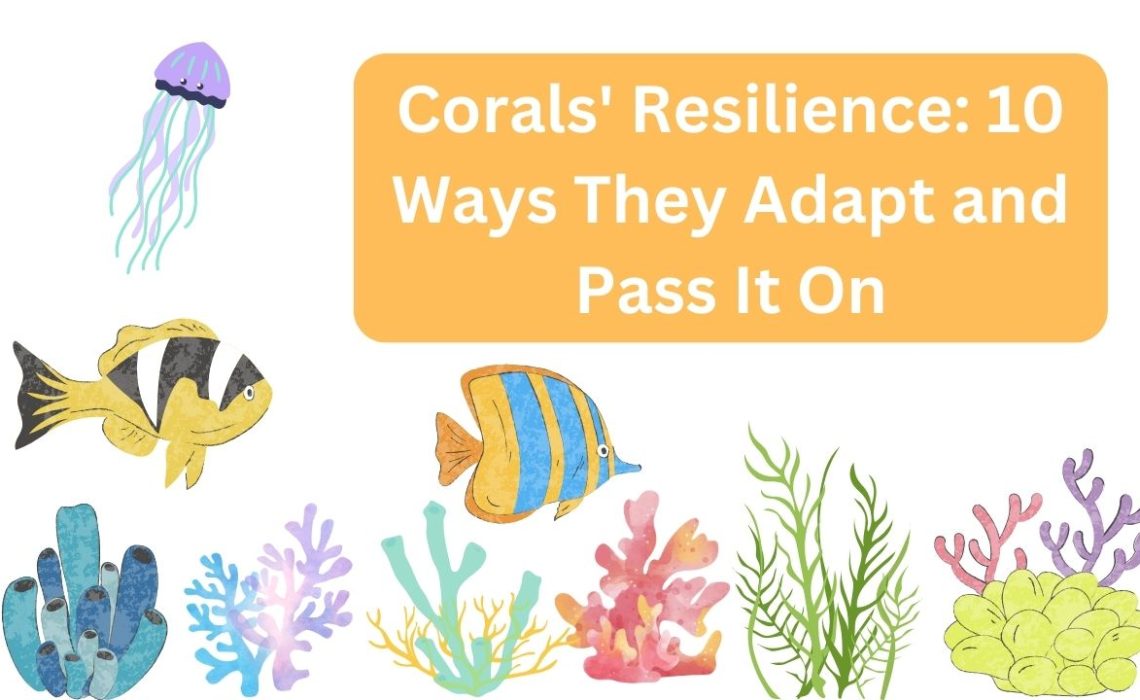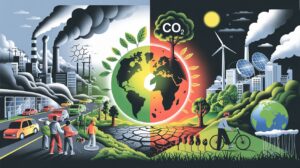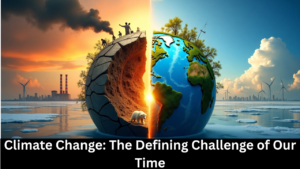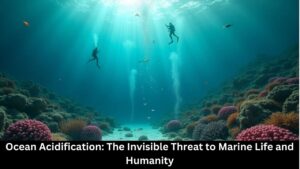Corals’ Resilience: Coral reefs are one of the most important ecosystems on Earth, but they are increasingly threatened by climate change and other stressors. Corals have a remarkable ability to adapt to environmental changes, but it is important to understand how they do this in order to protect them.
This article will discuss the key ways that corals adapt to environmental changes and pass on resilience to their offspring. By understanding these mechanisms, scientists can develop better strategies for managing coral reefs and helping them to survive in the face of climate change
Table of Contents
Toggle10 point of Corals’ Resilience
1.Genetic variation:
Corals have a high degree of genetic variation, which means that there are many different versions of genes within a population. This genetic variation allows corals to adapt to a wide range of environmental conditions.
2. Natural selection:
Over time, corals that are better adapted to their environment are more likely to survive and reproduce. This process of natural selection leads to populations of corals that are more resilient to environmental changes.
3. Symbiotic relationships:
Corals share a mutualistic bond with tiny algae known as zooxanthellae. These algae live within the coral’s tissues and provide it with energy through photosynthesis. Some corals can switch to different types of zooxanthellae that are more resilient to certain environmental stresses.
4. Epigenetic changes:
Epigenetic changes are changes in gene expression that are not caused by changes in the DNA sequence itself. These changes can be inherited across generations. Epigenetic changes can help corals to adapt to environmental changes by altering the way that their genes are expressed.
5. Heat tolerance:
Some corals have evolved to be more tolerant of high temperatures. This heat tolerance can be passed down from parents to offspring.
6. Ocean acidification tolerance:
Some corals have evolved to be more tolerant of ocean acidification. This tolerance can be passed down from parents to offspring.
7. Disease resistance:
Some corals have evolved to be more resistant to disease. This resistance can be passed down from parents to offspring.
8. Recovery from bleaching:
Some corals are able to recover from bleaching more quickly than others. This ability to recover can be passed down from parents to offspring.
9. Sexual reproduction:
Sexual reproduction allows corals to produce offspring with a variety of genetic combinations. This genetic diversity helps to make coral reefs more resilient to environmental changes.
10. Asexual reproduction:
Asexual reproduction allows corals to produce clones of themselves. This can help to spread heat-tolerant or disease-resistant genes throughout a population.
How coral resilience is passed on:
Coral resilience can be passed on to offspring through both sexual and asexual reproduction. During sexual reproduction, corals release sperm and eggs into the water. These sperm and eggs can combine to form offspring with a variety of genetic combinations. This genetic diversity helps to make coral reefs more resilient to environmental changes.
During asexual reproduction, corals produce clones of themselves. This can help to spread heat-tolerant or disease-resistant genes throughout a population.
In addition to genetic inheritance, coral resilience can also be passed on through epigenetic changes. Epigenetic changes are changes in gene expression that are not caused by changes in the DNA sequence itself. These alterations have the potential to be bequeathed through successive generations.
Epigenetic changes can help corals to adapt to environmental changes by altering the way that their genes are expressed. For example, corals that have been exposed to high temperatures may develop epigenetic changes that make them more heat-tolerant. These epigenetic changes can then be passed down to their offspring.
By understanding how corals adapt to environmental changes and pass on resilience, scientists can develop better strategies for protecting coral reefs from the impacts of climate change and other stressors
External Resources
Here are some resources on how corals adapt to environmental changes and pass on resilience:
- Surprise discovery about coral resilience may help reefs survive climate change (University of Southern California)
- How do corals adapt to environmental changes? (Great Barrier Reef Foundation)
- Research shows corals can cope with climate change better than previously thought (Tropic Now)
- Coral adaptation to climate change: a review (Frontiers in Marine Science)
- The role of epigenetics in coral adaptation to environmental change (Environmental Epigenetics)
- Genetic variation and adaptation in corals (Molecular Ecology)
- Natural selection and coral adaptation (Proceedings of the National Academy of Sciences)
- Symbiotic relationships and coral adaptation (Nature Climate Change)
- Sexual and asexual reproduction in corals (Coral Reefs)
- Coral reefs and climate change: adaptation and management (Springer)
- Coral reef resilience: insights from genetics, physiology, and ecology (Oxford University Press)






